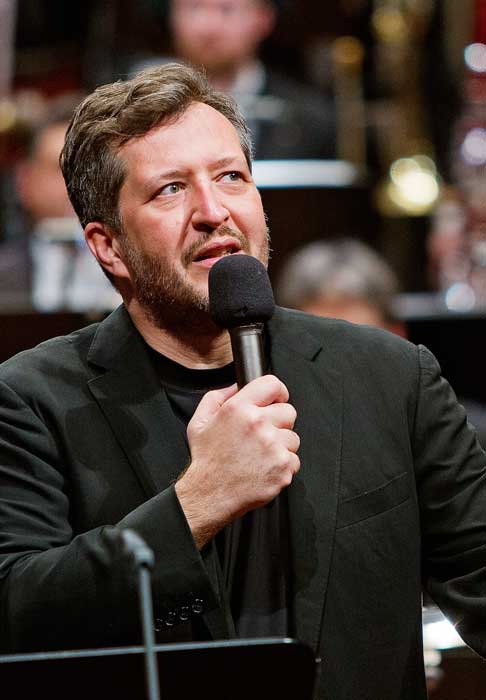léonie sonning music prize 1989
The Lavtian violinist Gidon Kremer received the Léonie Sonning Music Prize of 200,000 Danish kroner at a concert on 28 April 1989 at the Tivoli Concert Hall in Copenhagen. Kremer chose to play Alfred Schnittke’s Violin Concerto No 4, written for him in 1984. The concert was broadcast live on the Danish Broadcasting Corporation’s P2 radio channel.
The prize was presented by the Royal Theatre’s Head of Opera Poul Jørgensen, who included in his short speech the following words: ‘The decision for the prize committee was an easy one, and I am sure you can feel tonight that the audience agrees with it.’
citation
‘Gidon Kremer is indisputably one of the great virtuosos of our time, but has adopted a different attitude to that of the commercial star-artist. With a great curiosity he has put his rare abilities into testing the outer realms of his instrument and its music. With his highly individual performances of both older and contemporary works he has helped to counteract the stagnation and superficiality that both threaten the classical music tradition.’
You can listen to the speeches from the ceremony here:
The programme
Veljo Tormis Overture No 2
Alfred Schnittke Violin Concerto No 4
George Rochberg Caprice Variation (encore)
Mussorgsky Pictures at an Exhibition
The Royal Danish Orchestra
Conductor: Eri Klas
Gidon Kremer and Denmark
When Gidon Kremer appeared in Denmark for the first time in 1979, his native Latvia was an involuntary member of the Soviet Union. It was, therefore, as a Soviet violinist that Kremer appeared on that occasion with the Royal Danish Orchestra and also played a chamber concert at the Odd Fellow Palace. In the period 1978-80 Kremer had been allowed to travel freely in the West and give concerts. When his permit was not extended, he instead applied for permission to settle in the West, which was granted in 1980. In 1980 and 1986, Kremer was a soloist at the Danish National Symphony Orchestra’s subscription concerts. In 1986 he also gave a chamber concert at the Tivoli Concert Hall with András Schiff, and was a soloist in Sibelius’s Violin Concerto with the Aalborg Symphony Orchestra. Since then, Kremer has performed several times in Denmark both as a soloist with the DNSO (among others) and at the Louisiana Museum of Modern Art.
In connection with the prize concert, Gidon Kremer led a master-class with conservatory students and on 30 April, played a chamber concert in the Tivoli Concert Hall with musicians from his own Lockenhaus Festival in Austria including violinist Isabelle van Keulen, violist Tabea Zimmermann and pianist Oleg Maisenberg. On the program were works by Mahler, Schnittke and Prokofiev. The concert was broadcast live on the Danish Broadcasting Corporation’s P2 radio channel.
The daily press wrote, among other things:
Gidon Kremer received the Léonie Sonning Music Prize at a Royal Danish Orchestra concert. True to habit, he challenged the audience with unusual music including his friend Alfred Schnittke’s Violin Concerto No 4, making sure there was absolutely no doubt about his intent in the process. As with Mahler, one senses everywhere a formless existential program behind the notes, and here too it is about the relationship between past and present, only even more tense than at the turn of the century. Schnittke’s Violin Concerto No 4 is not without problems; the journey fluctuates and the material is sometimes weakly defined, but it conveys a gripping message with its originality and great emotional strength. With Kremer, it is always important to talk about humanity as it stands today.
(Jan Jacoby, Politiken, 30 April 1989)
Gidon Kremer is a researcher and philosopher on his instrument. He is musically as irresistible as he is dangerous, showing the way into the hinterlands. Dare you join? Have you the courage to leave terra firma? At least you could laugh. As in the encore. Why? Because it was so improbable. Because we heard something you can’t hear, that a violin can’t play. It can’t take such high notes. You can’t switch right hand and left hand in a way that determines the pitch and the string at a stroke. There is so much you can’t do, that Kremer does anyway. […] Schnittke’s music, with its almost fragile questioning, sometimes bombastic affirmation, almost parodying, experimenting, distracting, in short eternally stimulating character, gives Kremer every opportunity to embark upon the musical journey of discovery that is his passion and vocation. It is an honour for us, that he would receive the Sonning Prize.
(Bjørn Bredal, Weekendavisen, 5 May 1989)





